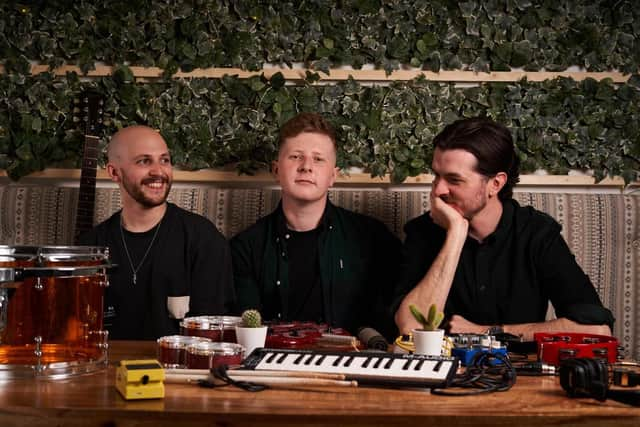Album reviews: Arctic Monkeys | Taylor Swift | A-ha | Nuclear Club


Arctic Monkeys: The Car (Domino) ****
Taylor Swift: Midnights (Republic Records) ***
A-ha: True North (RCA) ***
Nuclear Club: Polynomad (Self-released) ***
Leathers to the back of the wardrobe, and smoking jacket on as Arctic Monkeys continue to float into esoteric orchestral territory on their latest album, with teasing frontman Alex Turner supplying impressionistic lyrics to pore over or just go with, gloriously embellished with cinematic string arrangements by a cinematic string arranger. Bridget Samuels’ previous credits include Midsommar and Under the Skin, so atmosphere is not wanting.
The classy sadness of opening track and first single, There’d Better Be A Mirrorball, signals that we are in the sumptuous sphere of previous album Tranquility Base Hotel + Casino, with Turner “giving it the old romantic fool” over gently eddying strings. Jetskis on the Moat plays into the image of the remote rock star – we’re a long way from the young Monkeys of Riot Van as Turner employs his best John Lennonesque croon.
Advertisement
Hide AdAdvertisement
Hide AdI Ain’t Quite Where I Think I Am could be a commentary on Turner’s songwriting. He had originally intended to return to a heavier indie guitar sound for this album, but wasn’t producing the goods. Instead, he and the band sound entirely suited to a sonic combo of heady string swell and wah-wah funk guitar, reminiscent of Sixties symphonic pop composer David Axelrod, and pull off other stylistic flourishes in the foreboding fuzz synthesizer chords and tom drums of Sculptures of Anything Goes, tremulous disco strings and jazz funk synths of Hello You, and silky balladry of Mr Schwartz.


Taylor Swift mixes it up moderately on her tenth album, continuing her prolific run over the last few years with a lucky thirteen new tracks, chronicling different sleepless nights through her life. Musically, there is little to convey a long dark night of the soul but lyrically she produces a wee small hours cocktail of love, hate, doubt, fragility and dreaminess.
As usual, the release has been rigorously stage managed to appear as organic as possible. Regardless, Swift conveys a relatable understanding of the emotional lives of mere mortals, with plenty material for those who want to rake over the lyrics, and sufficient empathy for those who want to feel validated.
Working again with producer Jack Antonoff, she adopts a spectrum of pop flavours, from the soft synth arpeggios of Mastermind to the comfort blanket of electronics which envelops typical Swift pop tune You’re On Your Own, Kid. Her vocals are unexpectedly pitchshifted on Midnight Rain, while Vigilante Shit is a vaguely mysterious trip-hop track about “dressing for revenge”. Elsewhere, Swift and Lana Del Rey continue to morph into each other when the latter guests on Snow on the Beach, a featherlight pop ballad only notable for rhyming “planet”, “Janet” and “can it?”
From Arctic Monkeys to Arctic Philharmonic, who elevate the latest album of MOR pop by Norwegian trio A-ha with their elegant orchestration. True North is billed as an environmental dispatch from their home country, recorded in the town of Bodø,which lies 90km above the Arctic Circle. Inspired by Bruce Springsteen’s Western Stars, there is an accompanying film of their time in the studio – one for the hardcore fans, perhaps, as the musical results are steady rather than scintillating, from the graceful expansive pop of I’m In through to the tender You Have What It Takes, via the Bacharachian easy listening of Bumblebee and Oh My Word, which borders on the twee.


Meanwhile, far from the marketing campaigns of the big pop beasts, Perth-based alt.rock trio Nuclear Club self-release their confident third album, which aspires to the widescreen canvas so readily available to A-ha. Polynomad seamlessly folds indie, pop, rock and electronica elements into a sleek soundworld of seductive chord changes and embedded harmonies which give their songs wings.
CLASSICAL
Tudor Music Afterlives (Delphian) ****
In their second album for Delphian, early music group Ensemble Pro Victoria explore a range of Tudor vocal music less mainstream and more varied than we are used to, along with useful examples of overseas influences. Yes, composers like Tallis, Tavener and Sheppard appear, but so do less familiar names, such as Nicholas Ludford or Flemish lutenist and composer Philip van Wilder. The style of writing ranges from Ludford’s bold Missa Feria with its antiphonal dialogues between voices and improvised organ (Magnus Williamson) and lute-accompanied works by Sheppard and Robert Parsons, to more advanced motets and anthems by Tallis and such mainland European titans as Orlando de Lassus. The result, aided by ripe, refined performances under Toby Ward, is a helpful illustration of the greater complexity of writing from that period than we normally acknowledge. All of it sold with knowing conviction. Ken Walton
JAZZ
Arild Andersen Group: Affirmation (ECM) *****
Advertisement
Hide AdAdvertisement
Hide AdCelebrated Norwegian double-bassist Arild Andersen assembles a potently empathetic grouping with saxophonist Marius Neset, pianist Helge Lien and drummer Håkon Mjåset Johansen. An inspired exercise in improvisational alchemy, it takes the form of the seven group extemporisations of Affirmation Parts 1 and 2, plus a closing Andersen composition, the melodic Short Story. Andersen’s spare bass articulations open Affirmation Part 1 unveiling a beguiling sound world of glistering piano, hissing cymbals, eloquent tenor saxophone and Andersen’s atmospheric pedal effects, all of which ebb and flow throughout the album, setting the scene for muscular outbursts and haunting meditations. Lingering sax phrases echo through spectral soundscapes, or take on edge and urgency before settling into a luscious, ballad-like conclusion, all threaded through with Andersen’s majestic, ever-authoritative bass. Jim Gilchrist